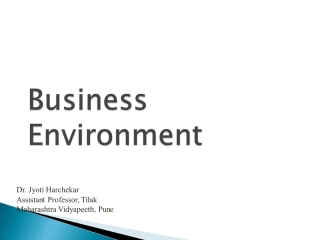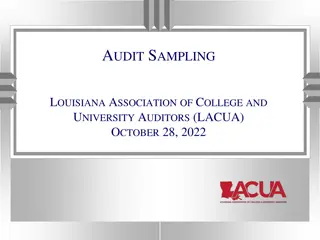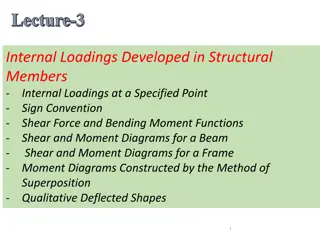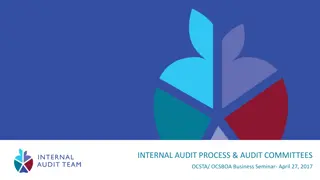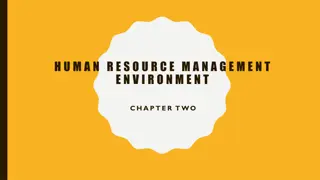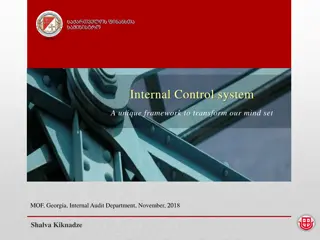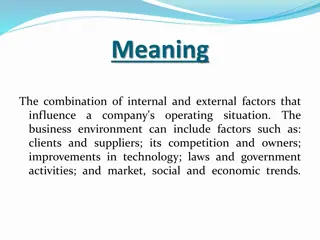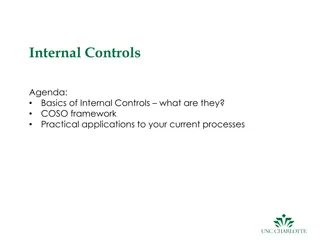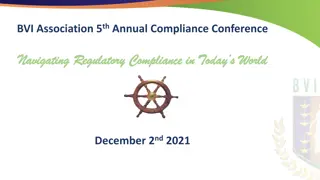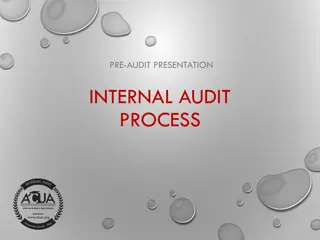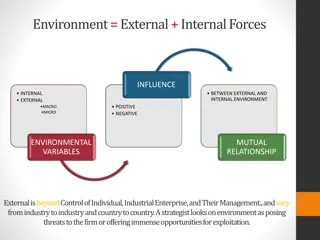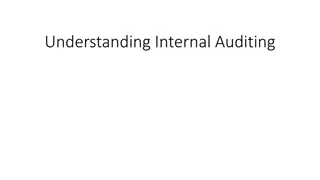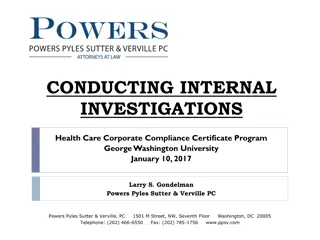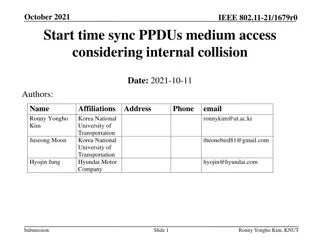Business Environment
The importance of internal and external factors in influencing business decisions. It covers the challenges presented by the business environment, the process of environmental analysis, and the tools used to monitor and evaluate the environment. The article also explores the significance of internal
10 views • 29 slides
Effective Internal Control Program in New York State
Learn about managing and evaluating the internal control system within New York State, specifically focusing on the State University of New York (SUNY). The program covers the roles, responsibilities, and activities supporting compliance with state regulations. Discover the purpose and outcomes of i
0 views • 29 slides
Internal Ism auditor
Amidst the maritime industry's stringent safety regulations, the Internal ISM Auditor Micro Credit Course aims to equip participants with the necessary auditing skills to ensure compliance with the ISM Code. This course delves into the importance of internal audits for ship safety, emphasizing the s
0 views • 29 slides
Exploring Hybrid Auditing Methods in Corporate Governance
Project led by Gunilla Eklöv Alander delves into assessing security in corporate governance without an internal audit function. The study examines various professions contributing to digitalized internal control environments and analyzes the traditional division of responsibilities between internal
2 views • 8 slides
Understanding Contextual Factors in Curriculum Development
This chapter delves into the significance of internal and external contextual factors in shaping curriculum development. It discusses the process of gathering essential contextual data, identifying relevant sources, and integrating data to create an evidence-informed, context-relevant, unified curri
5 views • 31 slides
How often should we carry out the internal Pallet Racking Inspections
Internal pallet racking inspections should be carried out on a regular basis to ensure safety and compliance with relevant standards. The recommended frequency for these inspections is as follows:\n\n\n\/\/rackinginspection.wordpress.com\/2024\/05\/23\/how-often-should-we-carry-out-the-internal-pall
1 views • 2 slides
Ensuring Effective Internal Controls for Payment Collection
Enhance USF business practices by establishing strong internal controls for accepting payments. Learn about segregation of duties, defining accountability, and the role of internal controls in protecting funds and ensuring compliance with regulations and laws.
0 views • 40 slides
Audit Sampling Guidelines and Reference Materials for Internal Auditors
Review authoritative guidance for audit sampling and the potential for external auditor reliance on internal auditors. Understand and apply concepts related to audit sampling to project results with certainty. Available reference materials include AICPA Codification of Statements, AICPA Audit Guide,
6 views • 114 slides
Understanding Homeostasis: Maintaining Internal Balance in the Body
The concept of homeostasis is crucial for understanding how the body maintains a stable internal environment despite external fluctuations. This presentation covers the definitions of positive and negative feedback mechanisms, components of feedback loops, and the role of homeostatic mechanisms in p
0 views • 33 slides
Understanding the First Law of Thermodynamics in Science Lectures
Explore the concept of the First Law of Thermodynamics through a series of engaging science lectures by Dr. Jasim Al-zanganawee from Diyala University. Learn about energy transfer, conservation, internal energy of ideal gases, and how heat and work impact a system's total energy. Discover the relati
0 views • 15 slides
Understanding Internal Loadings in Structural Members
Internal loadings in structural members, such as beams and frames, are essential for design. This chapter explores the analysis of shear forces, bending moments, and axial forces, providing methods to determine these forces graphically using shear and moment diagrams. Learn about the sign convention
0 views • 35 slides
Internal Medicine Stage 1 Curriculum Teaching Toolkit: Capabilities in Practice
Capabilities in Practice (CiPs) describe the professional tasks within the scope of internal medicine, utilizing expert assessors for assessment validity. There are 14 CiPs as learning outcomes for internal medicine Stage 1, with descriptors, performance levels, and evidence for entrustment decision
0 views • 11 slides
Internal Audit Process & Audit Committees Overview
Explore the functions and responsibilities of internal audit processes and audit committees in the context of school boards in Ontario. Covering topics such as governance, risk management, compliance, and internal controls, the content delves into the structure, mandate, and activities of internal a
2 views • 34 slides
Understanding Homeostasis in Humans: The Key to Maintaining Internal Balance
Homeostasis refers to the body's ability to regulate and maintain a constant internal environment despite external changes. In humans, the tissue fluid plays a crucial role in this process, with factors like pH, water concentration, oxygen levels, temperature, and glucose content needing to be contr
0 views • 80 slides
New Risk Management and Internal Audit Framework for Local Councils in NSW
This framework outlines the importance of audit, risk, and improvement committees (ARIC), internal audit (IA), and risk management (RM) in local councils in NSW under the Local Government Act 1993. It defines key terms, such as Audit Committee, Internal Audit, Risk Management, and the three lines of
1 views • 31 slides
Impact of Data Analytics and Consulting Activities on Internal Audit Quality
This research examines how the use of data analytics and consulting activities affect perceived internal audit quality. The study investigates the relationship between these factors and top management's perception of internal audit quality. Through online scenario-based experiments with middle and t
2 views • 11 slides
Technical Guide on Audit of Internal Finance Controls in Public Sector Banks
This technical guide provides insights into the audit of internal finance controls in public sector banks, covering topics such as joint auditors' responsibilities, common controls, centralized controls, business cycles, entity level controls, IT controls, reporting processes, and more. It offers de
2 views • 6 slides
Internal Audit Planning and Practices for Effective Risk Management
Planning an internal audit following EC practices is crucial for enhancing and protecting organizational value. The Internal Audit Service's mission focuses on providing risk-based assurance and advice to improve risk management, control, and governance processes. From audit engagement to kick-off,
0 views • 17 slides
Understanding Internal Financial Controls and Regulatory Mandates
This content provides insights into Internal Financial Controls (IFC) and its significance in ensuring efficiency, fraud prevention, accuracy in accounting, and timely financial reporting. It also delves into regulatory mandates under the Companies Act of 2013, specifying requirements for auditors'
1 views • 19 slides
Republic of South Africa (RSA): COSO Components 2 & 3 with 3 Lines of Defence Approach
The presentation delves into RSA's approach to the COSO components, focusing on Risk Assessment and Internal Controls. It discusses the legislative mandate, Treasury regulations, and the COSO Internal Control Integrated Framework. The Risk Assessment section covers levels, matrices, and key instrume
0 views • 13 slides
Understanding Environmental Factors in HRM Management
A diagnostic model in HRM framework assists managers in analyzing and solving HRM-related problems by focusing on factors like job design, performance evaluation, benefits, and organizational values. Managers need a profound understanding of internal and external environments to make informed decisi
3 views • 38 slides
Understanding Internal Control Systems and Processes in Organizations
Internal control systems play a vital role in governance and risk management within organizations. They encompass processes, measures, and outcomes that help in achieving objectives, ensuring compliance, safeguarding resources, and managing information systems effectively. This framework involves ma
0 views • 16 slides
Understanding Business Environment: Internal and External Factors
The business environment is shaped by a combination of internal and external factors that impact a company's operations. Internal factors like shareholders, management structure, and human resources are under the company's control, while external factors such as economic, social, technological, and
0 views • 12 slides
Understanding Internal Controls and the COSO Framework
Internal controls play a vital role in organizations, providing reasonable assurance on achieving objectives. The COSO framework outlines the five integrated components of internal control, emphasizing the importance of control environment, risk assessment, control activities, information, and monit
1 views • 18 slides
Navigating Regulatory Compliance in Today's World - Internal Audit Insights
Explore the essential aspects of internal audit functions in regulatory compliance, including purpose, requirements, features, and responsibilities. Learn how internal audit helps protect assets, assess risks, and enhance governance effectiveness.
1 views • 17 slides
Understanding Internal Audit and Controls Process
This content provides an overview of the pre-audit presentation, objectives of the presentation, the definition of internal audit, the role of internal audit in examining university departments, the university audit process, internal audit reporting lines, and insights on internal controls in an org
3 views • 30 slides
Overview of Internal Combustion Engines and Their Components
Internal combustion engines are devices that convert fuel's chemical energy into thermal energy, which is then used to produce mechanical work. The engines can be classified into two types - External Combustion Engines and Internal Combustion Engines. Internal combustion engines include components l
2 views • 53 slides
Internal Audit Department Overview
The Internal Audit Department at the University of North Carolina Charlotte is led by Chief Audit Officer Jennifer Walker and Internal Audit Manager Kevin Vehar. The team provides risk-based assurance, advisory services, and investigations to enhance organizational value. Their mission is to offer o
1 views • 17 slides
Understanding the Impact of Internal Environment Components on Business Decisions
The internal environment of a business is influenced by factors like value systems, vision, management structure, internal power relationships, and human resources. These components have a direct impact on decision-making processes and organizational performance. By analyzing and understanding these
1 views • 32 slides
Changes to IIA Qualifications and Tuition Programmes
The International Internal Auditors (IIA) is making changes to its qualifications and tuition programmes, phasing out the IIA Diploma and introducing the Certified Internal Auditor (CIA) and Qualification in Internal Audit Leadership (QIAL). Transition arrangements are in place for current students,
1 views • 14 slides
Insights into Internal Rotation in Molecules
Internal rotation in molecules, such as the methyl group in acetaldehyde and methyl acetate, involves large amplitude motions hindered by potential barriers. Quantum energy levels split due to tunneling effects, impacting rotational and torsional energy levels. Theoretical models like the Rho Axis M
0 views • 6 slides
Ecological Factors and Climatic Influences on Plant Life
Ecological factors play a crucial role in shaping the environment for organisms to thrive. This includes living (biotic) and non-living (abiotic) components like climatic factors, edaphic factors, topographic factors, and biotic factors. Climatic factors such as light, temperature, water, wind, and
0 views • 14 slides
Understanding Internal Auditing: Role and Importance
Internal Audit Department exists to provide independent assurance, consulting services, and improve operations by evaluating risk management, internal controls, and governance processes. It reports to the campus president and the Director of System-wide Internal Audit at TBR while serving the colleg
0 views • 7 slides
Partnership Internal Communications Plan & Stakeholder Analysis
Developing an effective internal communications plan for a partnership involves drawing insights from stakeholder analysis, drafting, validating, and implementing the plan. Engaging with internal stakeholders, understanding their awareness, engagement levels, and expectations, and prioritizing commu
1 views • 6 slides
Understanding Factors and Prime Factors in Mathematics
Explore the concept of factors and prime factors through practical scenarios involving Jedward, stationary supplies, and school choirs. Learn how to find factors of numbers like 18 and 30, identify prime numbers, write numbers as products of prime factors, determine common factors, and calculate low
0 views • 19 slides
Internal Investigations in Corporate Compliance
An internal investigation in corporate compliance involves probing suspected misconduct within an organization. It is a crucial element of compliance programs, aimed at uncovering facts, halting violations, implementing remedies, and considering disciplinary actions or self-disclosure to authorities
0 views • 26 slides
Understanding Experiments and Threats to Validity
Explore the world of experimental research, internal and external validity, threats to validity, and the importance of proper study design in ensuring the credibility of research results. Learn about confounding variables, threats to internal validity such as environmental factors and group comparis
0 views • 15 slides
DEPFET Internal Amplification vs. Oxide Thickness Simulation Study by Rainer Richter
The study explores the behavior of DEPFET internal amplification in comparison to oxide thickness through simulations conducted by Rainer Richter at the MPG Halbleiterlabor workshop. It delves into the differences in behavior between DEPFET and classical MOS transistors, shedding light on the reason
0 views • 11 slides
Understanding Start Time Sync Procedures in IEEE 802.11-21/1679r0
In the document authored by Ronny Yongho Kim et al., the focus is on start time sync PPDU medium access considering internal collision in IEEE 802.11-21/1679r0. It discusses the importance of defining a clear rule to resolve internal collision cases during medium access procedures. Specific attentio
0 views • 9 slides
Importance of Ethics in Internal Audit Practices
Ethics play a crucial role in internal audit, ensuring good governance, trust, and accountability. This article explores the definition of ethics, ethical culture, the IIAs Code of Ethics for Internal Auditors, and the significance of upholding ethical standards in conducting internal audit work.
0 views • 52 slides
